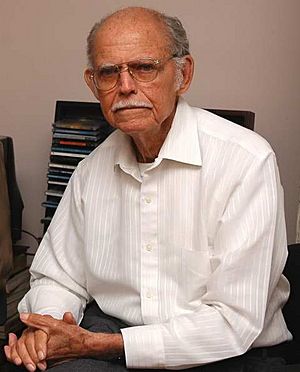Huber Matos facts for kids
Quick facts for kids
Huber Matos
|
|
|---|---|

Matos in 2011
|
|
| Born | 26 November 1918 |
| Died | 27 February 2014 (aged 95) Miami, Florida, U.S.
|
| Nationality | Cuban |
| Occupation | Political leader, writer |
| Known for | Comandante, Cuban Revolution |
Huber Matos Benítez (born November 26, 1918 – died February 27, 2014) was a Cuban military leader, writer, and activist. He was known for opposing the government of Fulgencio Batista. Matos fought alongside Fidel Castro and other revolutionaries to remove Batista from power.
After the Cuban Revolution succeeded, Matos disagreed with Castro's new government. He felt it was becoming too focused on communist ideas. Because of his protests, he was put in prison for 20 years. After his release in 1979, he continued to speak out against the Cuban government. He lived in Miami, Florida, and Costa Rica.
Contents
Huber Matos: A Cuban Story
Early Life and Beginnings
Huber Matos was born in Yara, a town in Cuba. He became a school teacher in Manzanillo. He also owned a small farm where he grew rice. Matos joined a Cuban political group called the Partido Ortodoxo. This group wanted a fair and honest government for Cuba.
Fighting for Change: The Revolution
When Fulgencio Batista took control of Cuba in 1952, Matos joined the resistance movement. This group worked to overthrow Batista's rule. Matos moved to Costa Rica for a few years. From there, he helped the 26th of July Movement rebels. These rebels were fighting in the Sierra Maestra mountains. Matos helped them get weapons and supplies. He even flew a plane with five tons of supplies to Castro's rebels in March 1958.
In August 1958, Fidel Castro made Matos a combat commander. Matos led a group of rebel soldiers called the Antonio Guiteras group. He helped lead the final attack on Santiago de Cuba. This battle ended the military part of the revolution. In January 1959, Matos rode into Havana on a tank. He was part of a victory parade with Castro and other revolutionary leaders. Soon after, he became the Commander of the Army in the province of Camagüey.
A Disagreement with Castro
By July 1959, Matos started to speak out. He felt the revolution was moving in a direction he did not like. He gave speeches against communism in Camagüey. This led to a long disagreement between him and Fidel Castro. Matos sent a letter to Castro, saying he wanted to resign from his position.
Castro and Matos met to talk about it. Castro told Matos that his resignation was not a good idea at that time. He admitted that some leaders were interested in Marxism. But he told Matos to forget about resigning for a while.
However, Matos continued to worry about communist influence. In October, he sent another resignation letter to Castro. A few days later, Castro sent another revolutionary leader, Camilo Cienfuegos, to arrest Matos. Matos was arrested along with some of his military helpers.
Years in Prison
After his arrest, Castro held a large public meeting. He asked the crowd if Matos should be punished. Many people shouted for him to face a firing squad. However, Castro decided not to execute Matos. He said he did not want to make Matos a martyr.
Matos and several other officers who supported him were put on trial. Matos said he had talked about his concerns with other officers. But he denied planning anything against the government. Fidel Castro spoke for seven hours at the trial. He accused Matos of working against the revolution. On December 15, 1959, the court found Matos guilty. He was sentenced to twenty years in prison.
Matos spent his first years in prison on the Isla de la Juventud. This was the same prison where Castro had been held years before. He then spent the rest of his sentence in La Cabaña Prison in Havana. Matos served his full sentence. He was released from prison on October 21, 1979.
Life After Prison
Huber Matos was 60 years old when he was released from prison. He reunited with his wife and children in Costa Rica. They had left Cuba in the 1960s. Later, they moved to Miami, Florida. Matos lived there until he passed away in February 2014.
His sons, Huber Matos Jr. and Rogelio Matos, also became active in opposing the Cuban government. In 1981, Huber Matos started an organization called Cuba Independiente y Democrática (CID). This group ran radio stations that sent uncensored news into Cuba. Matos believed that change in Cuba would come from informed citizens on the island.
He also wrote a book about his experiences called Cómo llegó la noche (How the Night Came). Matos worked as the secretary general for CID, which was based in Miami. He also founded the Huber Matos Foundation for Democracy. This group works to support democracy, human rights, and education in Latin America, especially in Cuba.
Huber Matos died in Miami, Florida, at the age of 95.
See also
 In Spanish: Huber Matos para niños
In Spanish: Huber Matos para niños
 | Charles R. Drew |
 | Benjamin Banneker |
 | Jane C. Wright |
 | Roger Arliner Young |

